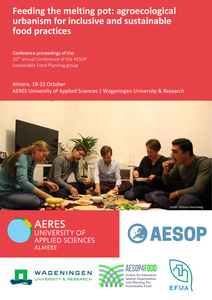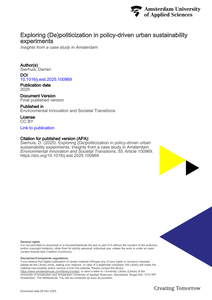Rivers all over the world are deteriorating in a fast rate. As a response, movements in the defence of rivers emerge and aim to restore and protect rivers. One of these defence strategies is to politicise fish to generate arguments for the protection of rivers, drawing from a fish-friendly river imaginary. The concept of river imaginaries describes that power is exercised through and by knowledge generated in truth regimes. In this poster presentation, we elaborate on two cases in which fishing people and their allies use a variety of truth strategies, resonating with specific fish-friendly river imaginaries. Both case studies are influenced by harmful mining and industry practices that pollute the river and wetland.The Dutch case study of the Border Meuse river reveals that the main argument to politicise fish is that infrastructural interventions and hydropower is killing and damaging fish. Through knowledge generating on the amount of fish-death and the aquatic state, a knowledge agenda is set and power is exercised to stop harmful river activities. The Colombian case of the Zapatosa wetlands reveals that the main argument to politicise fish is that fish is the main source of food. Through knowledge generating that focusses on re-learning from past artisanal fishing strategies and biocultural adaptation, a knowledge agenda is set and power is exercised to stop harmful mining practices. Although these river movements are using truth regimes to defend rivers, counter facts, counter norms, and counter agendas in the defence of harmful practices remain to exist.
DOCUMENT

This opinion piece addresses issues surrounding the role of researchers’ behaviour in bridging the science–policy gap in sustainable tourism mobility. Currently, the research agenda on bridging this gap encompasses the development of fuller understanding of the determinants of tourist behaviours, and only a partial understanding of the behaviour of policy-makers and industry. That latter area needs research to identify how those key actors can be encouraged towards developing sustainable tourism mobility. This paper argues that key determinants of researchers' behaviour need to be added to that research agenda. It discusses seven tensions and structures hindering researchers exploring how to mobilise and engage with other industry and policy-makers, including dangers related to the politicisation of science, balancing objectivity and engagement, and the consequences of the current publication culture that characterises the academic community. The discussion concludes with a call for action to researchers to address these tensions and structures. It suggests four ways forward, including informed and skilled engagement with the quality mass media, using proven methods of academic–industry cooperation, workshops to help editors and reviewers to better understand practice-linked, values-driven research issues and the creation of a policy-makers' industry and researchers' action group to encourage joint projects.
LINK
This text reflects on the recent Landscape Makers Congress co-organised by Studio Inscape as a design intervention seeking to re-politicise the South-Western Delta region (SWD) of the Netherlands. Like many coastal regions around the world, the Dutch coast (including the SWD) is facing serious challenges from climate change. In the SWD, these challenges are taken up and politicised through the memory of a flood disaster that devastated the region in 1953. On the one hand, the legacy of this flood, which includes the coastal engineering structures of the Delta Works, makes the consequences of climate change salient to the region’s inhabitants. Frequently, inhabitants voice frustration with the impression that their concerns are not taken seriously enough and not translated into concrete political actions. On the other hand, the same legacy also silences debates and considerations on alternative ways of responding to the many challenges of the changing climate, restricting the scope of discussions to narrow anthropocentric narratives of the ‘threat’ of water and the ‘war’ between the Dutch and the sea. Using interactive theatre, the Landscape Makers Congress invited more than 100 regional inhabitants, policymakers, water engineers and representatives of environmental NGOs to consider the future of the landscape in the SWD from a range of different perspectives. During the day, participants represented one out of several more-than-human ‘landscape makers’ in a fictional parliament and engaged in debates on several key dilemmas and different spatial strategies, situated in different periods in the future (2030, 2050 and 2100). As the day progressed, the ‘parliament’ bore witness to some of the consequences of climate change as well as the consequences of the decisions they made themselves. Through plenary discussions, workshops and interventions during the day, the audience was engaged in discussions on some different futures that might be possible in the SWD and on whose values and interests should or should not be part of the process of constructing these futures. Based on our experiences on the day and activities in the region more generally, some reflections are offered on the different concepts and strategies operationalised in the Landscape Makers Congress: its playful use of multifocality, its dramatisation of temporality and its staging of a particular experience of politics. Thus, this text offers some reflections on community engagement using design-based methodologies in the context of politicised (and the politicisation of) environments.
DOCUMENT
These conference proceedings to the 10th annual conference of the AESOP Sustainable Food Planning group are organised as follows: the following four sections contain the short papers belonging to the four tracks that made up the conference (social inclusion; urban agriculture; urban planning, design and development; food governance). The last section consists of the abstracts of the book and poster presentations, a short report on the YAP workshop held at the first day of the conference, and a short report on the excursion organised at the last conference day.
DOCUMENT

This paper addresses the following question: What is the current opinion and conception of ordinary Dutch people regarding the influx of refugees from the Middle East, and how can local government formulate a policy on this issue?
DOCUMENT

ABSTRACT. It is now generally accepted that the quality of the regulatory arrangements should be appraised not only by looking at the institutional design, but also by evaluating the factual enforcement and implementation of regulations. It is therefore advised that national governments take a more active stance in supervising the regulatory enforcement by different regulatory agencies. However, in some cases, government’s activism might be an impeding factor in regulatory enforcement. That this is not so crazy idea shows the analysis of the regulatory enforcement by Lithuanian Competition Authority in the area of competition policy during the years of integration to the European Union. For example, not only political and financial independence of the Competition Authority was difficult to establish, but also functions and competences of the regulatory agency were changed a number of times, which hampered the effectiveness of the agency’s performance while enforcing the competition law. In addition to often changes of functions, also the scope of competences was changing. As a result, the variety of tasks attributed to the Lithuanian Competition Authority caused the growing overload of work, which further hindered its regulatory practice. The question is who can be blamed for that? Was it just the inexperience of the government who was seeking for the best institutional design and could not stop with redesigning the regulatory agency or was it the intentional behaviour guided by some concrete interests as a result of a regulatory capture? The analysis of the regulatory enforcement during the period of 15 years does not allow for disregarding of the second possibility.
LINK
Presentation at the European Conference for Social Work Research, Leuven: Belgium
DOCUMENT

Urban experimentation has gained traction with (supra-)national and local politics as a method for catalyzing change in urban systems and practices. Yet, with experiments becoming more commonly driven by established actors, concerns persist about their potential to sidestep political issues of power, exclusion and conflict fundamental to societal change. This paper seeks to unpack what exactly is at stake when the political is ignored or neutralized during an urban experiment. Using theories on the political as an analytical lens, the paper presents a case study of an urban experiment in Amsterdam, dissecting the ways in which (de)politicization operates in the experiment. The findings demonstrate that ignoring the political in urban experimentation risks excluding certain voices and options from being considered, which ultimately leads to stagnation. The paper concludes by outlining future challenges for research and practice that addresses (de)politicization in urban experiments.
MULTIFILE

Marine spatial planning (MSP) was developed as a place-based, integrated marine governance approach to address sectoral and fragmented management issues and has seen significant evolvement over the past two decades. MSP has rapidly become the most commonly endorsed management regime for sustainable development in the marine environment, with initiatives being implemented across multiple regions of the globe. Despite its broad and growing acceptance and use, there are several key challenges that remain, both conceptual and practical, that are negatively impacting the realization of MSP’s potential. These include institutional shortcomings, the exclusion of stakeholders, a failure to account for the human and social dimensions of marine regions, the marginalization of different types of knowledge, and the growing need to adapt to global environmental change. Although studies have examined the emergence of MSP in different geographical and institutional contexts, there is a lack of comparative analysis of how initiatives are progressing and if the foundational aims of MSP are being achieved. There is a need to analyze the degree to which MSP initiatives are responding to the environmental challenges that they have been set up to tackle and, as marine plans are setting out long-term visions for marine management, to understand if current initiatives are fit for purpose. This article responds to these concerns and reviews the evolution of MSP within 12 regional ocean areas. We utilize the term regional ocean areas to illustrate the geographical spread of MSP, with examinations conducted of the approach to MSP that specific nations within each of the 12 chosen clusters have followed. By critically assessing how MSP is progressing, it is possible to shed light on the opportunities and challenges that are facing current initiatives. This can help to reveal learning lessons that can inform future MSP systems and guide initiatives along more sustainable pathways.
DOCUMENT

Improved cookstoves aimed at reducing exposure to indoor air pollution have had a lasting presence in development and health discussions. Through this article we contribute to current debates in the field by reflecting on our experiences during a cookstove participatory project in two ‘non-notified’ communities, or ‘slums,’ in Bangalore, India. We interrogate the alignment between some of the central tenets and methods of participation and the lived experiences of participating communities. The current predominant recommendations focus on developing and implementing cookstoves tailored for user needs. Yet, the project implementation entered a space of uncertainty where the priorities and needs of participants were diverse and changing. While urban infrastructures related to housing and work security, drainage systems, access to health care, and aspects of governance, citizenship and rights, may seem to fall outside the scope of ICS projects, our experiences show how inescapably they shape participatory processes and technologies. We highlight the need to take a closer look at how we can include these broader and changing priorities and needs in our methodologies and reflect on how we can better respond and align them with the ways in which people live.
MULTIFILE
